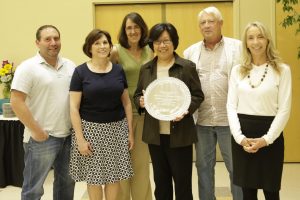 The William E. Bennett Award for Extraordinary Contributions to Citizen Science is given annually to both an individual and a team whose SENCER and other related activities have made exemplary and extraordinary contributions to citizen science. The award was established by NCSCE in 2009 and named in honor of its first recipient for his lifetime contributions to citizen science. As Wm. David Burns, NCSCE Executive Director, noted at the 2015 SENCER Summer Institute, “Bill Bennett is a towering leader in American education, and a great mentor to us in our work.”
The William E. Bennett Award for Extraordinary Contributions to Citizen Science is given annually to both an individual and a team whose SENCER and other related activities have made exemplary and extraordinary contributions to citizen science. The award was established by NCSCE in 2009 and named in honor of its first recipient for his lifetime contributions to citizen science. As Wm. David Burns, NCSCE Executive Director, noted at the 2015 SENCER Summer Institute, “Bill Bennett is a towering leader in American education, and a great mentor to us in our work.”
The 2015 individual and team honorees provide inspirational examples of local and global impacts to all of us as another academic year begins. Dr. Sherryl Broverman was honored with the individual award. Drs. Winnie Yu, James Tait, Vince Breslin, Terese Gemme, Terri Bennett, Susan Cusato of Southern Connecticut State University received the team award. Awardees were recognized during the Leadership Dinner at the recent SSI, where Burns remarked that, “The great notion of learning is that we really learn from each other, and I’ve learned a great deal from Sherryl and the group from Southern Connecticut.”
Dr. Sherryl Broverman, Individual Award
Dr. Sherryl Broverman, associate professor of the practice, biology and global health at Duke University, is well known and respected throughout the SENCER community. Nominators for Sherryl stated, “Global citizenship is often cited as an aspiration for students, and Sherryl really embodies that ideal in her educational work, both at Duke and in Kenya.” Sherryl’s remarkable achievements in both increasing attention to HIV disease in the Duke curriculum and advancing education of girls in Kenya emerged directly from her work with the SENCER project, and she has both inspired our community and served as model of rigorous science education through global engagement and service.
At the 2001 SENCER Summer Institute 2001, Sherryl became acquainted with colleagues from across Africa, and began what has now become a nearly 15-year collaboration. With Dr. Rose Odhiambo at Egerton University in Kenya, she developed a linked course. Since then, over 3,000 students at Duke have enrolled in Sherryl’s course, learning about the challenges facing their peers in Kenya and how they can have an impact. Sherryl and Rose also founded the Women’s Institute of Secondary Education & Research (WISER) Secondary school in Kenya, which has changed the lives of young girls and had measurable impacts on the larger community. In addition to educating girls, WISER works in partnership with the local school system to build capacity in the primary school and provides teacher training. The school and its founders have also tackled community issues that impact students’ ability to attend and prosper in school, including the availability of food and clean water. Sherryl movingly shared, “Now hundreds of families in a rural village in Kenya, who never had thought that their girl was worth anything or worth educating, now have their girls in high school and even university, because we’ve graduated two classes now. SENCER’s reach is both profound and wide.”
Southern Connecticut State University, Team Award
Since 2004, 32 faculty members from Southern Connecticut State University (SCSU), encompassing 12 departments and three of its schools, have attended Summer Institutes and both incorporated SENCER ideals into existing courses and programs as well as created new ones. Dr. DonnaJean Fredeen, Provost and Vice President for Academic Affairs at Rider University and former SCSU dean, notes, “There is no doubt that teaching to science through capacious, complex social issues has taken deep root at SCSU. It is through the sustained efforts of the faculty leadership team that SENCER and citizen science is part of the educational experience of all undergraduate students [at SCSU].” Drs. Winnie Yu (professor, computer science), James Tait (professor, environmental and marine studies), Vince Breslin (professor and chair, science education and environmental studies), Terese Gemme (professor of music and Honors College director), Terri Bennett (professor and chair, mathematics), and Susan Cusato (associate professor, science education and environmental studies) have been leaders in these efforts.
Three model courses have emerged from Southern Connecticut’s work: Computer Ethics by Terry Bynum, Science and the Connecticut Coast: Investigations of an Urbanized Shoreline by James Tait and Vince Breslin, and most recently, Pollinators: A Case Study in Systems Thinking and Sustainability by Susan Cusato and Suzanne Huminski. The courses are just a few examples of the creativity with which members of the team have approached curricula, as well as the “deep insights about some of the the things we need to understand about student needs when we think we are doing good things for students,” as David Burns described at SSI 2015. They also illustrate results of effective partnerships within and across the disciplines.
Learn more about past recipients of the William E. Bennett award, as well as the requirements for nominations for the 2016 awards, here.
